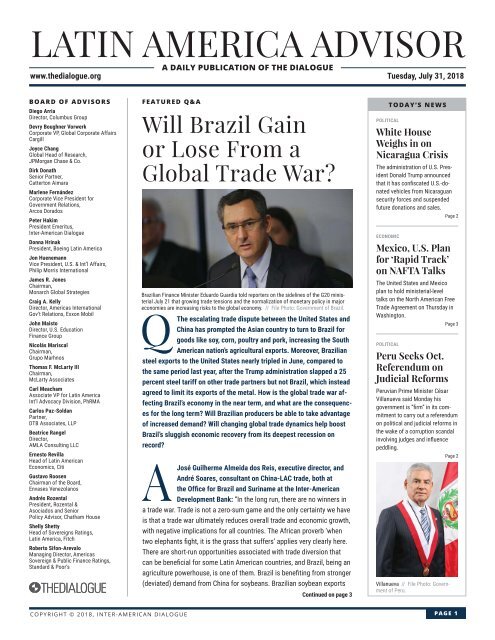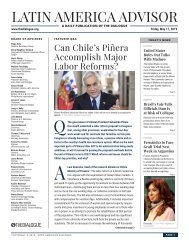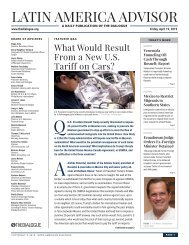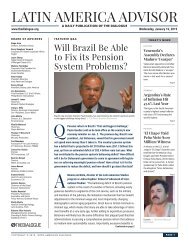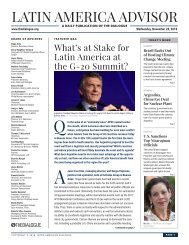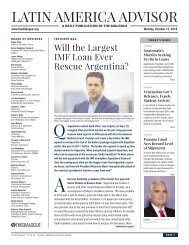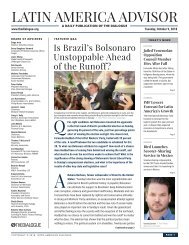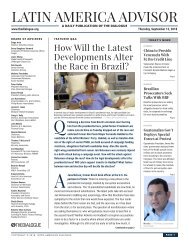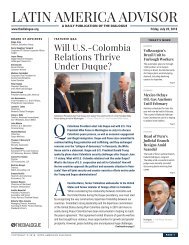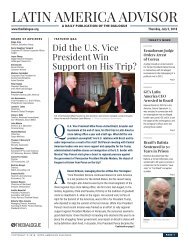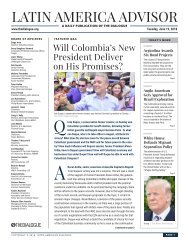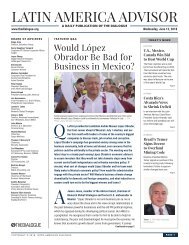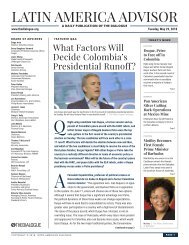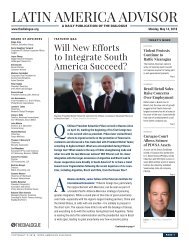Create successful ePaper yourself
Turn your PDF publications into a flip-book with our unique Google optimized e-Paper software.
LATIN AMERICA ADVISOR<br />
A DAILY PUBLICATION OF THE DIALOGUE<br />
www.thedialogue.org Tuesday, July 31, 2018<br />
BOARD OF ADVISORS<br />
Diego Arria<br />
Director, Columbus Group<br />
Devry Boughner Vorwerk<br />
Corporate VP, Global Corporate Affairs<br />
Cargill<br />
Joyce Chang<br />
Global Head of Research,<br />
JPMorgan Chase & Co.<br />
Dirk Donath<br />
Senior Partner,<br />
Catterton Aimara<br />
Marlene Fernández<br />
Corporate Vice President for<br />
Government Relations,<br />
Arcos Dorados<br />
Peter Hakim<br />
President Emeritus,<br />
Inter-American Dialogue<br />
Donna Hrinak<br />
President, Boeing Latin America<br />
Jon Huenemann<br />
Vice President, U.S. & Int’l Affairs,<br />
Philip Morris International<br />
James R. Jones<br />
Chairman,<br />
Monarch Global Strategies<br />
Craig A. Kelly<br />
Director, Americas International<br />
Gov’t Relations, Exxon Mobil<br />
John Maisto<br />
Director, U.S. Education<br />
Finance Group<br />
Nicolás Mariscal<br />
Chairman,<br />
Grupo Marhnos<br />
Thomas F. McLarty III<br />
Chairman,<br />
McLarty Associates<br />
Carl Meacham<br />
Associate VP for Latin America<br />
Int’l Advocacy Division, PhRMA<br />
Carlos Paz-Soldan<br />
Partner,<br />
DTB Associates, LLP<br />
Beatrice Rangel<br />
Director,<br />
AMLA Consulting LLC<br />
Ernesto Revilla<br />
Head of Latin American<br />
Economics, Citi<br />
Gustavo Roosen<br />
Chairman of the Board,<br />
Envases Venezolanos<br />
Andrés Rozental<br />
President, Rozental &<br />
Asociados and Senior<br />
Policy Advisor, Chatham House<br />
Shelly Shetty<br />
Head of Sovereigns Ratings,<br />
Latin America, Fitch<br />
Roberto Sifon-Arevalo<br />
Managing Director, Americas<br />
Sovereign & Public Finance Ratings,<br />
Standard & Poor’s<br />
FEATURED Q&A<br />
Will Brazil Gain<br />
or Lose From a<br />
Global Trade War?<br />
Brazilian Finance Minister Eduardo Guardia told reporters on the sidelines of the G20 ministerial<br />
July 21 that growing trade tensions and the normalization of monetary policy in major<br />
economies are increasing risks to the global economy. // File Photo: Government of Brazil.<br />
QThe escalating trade dispute between the United States and<br />
China has prompted the Asian country to turn to Brazil for<br />
goods like soy, corn, poultry and pork, increasing the South<br />
American nation’s agricultural exports. Moreover, Brazilian<br />
steel exports to the United States nearly tripled in June, compared to<br />
the same period last year, after the Trump administration slapped a 25<br />
percent steel tariff on other trade partners but not Brazil, which instead<br />
agreed to limit its exports of the metal. How is the global trade war affecting<br />
Brazil’s economy in the near term, and what are the consequences<br />
for the long term? Will Brazilian producers be able to take advantage<br />
of increased demand? Will changing global trade dynamics help boost<br />
Brazil’s sluggish economic recovery from its deepest recession on<br />
record?<br />
A<br />
José Guilherme Almeida dos Reis, executive director, and<br />
André Soares, consultant on China-LAC trade, both at<br />
the Office for Brazil and Suriname at the Inter-American<br />
Development Bank: “In the long run, there are no winners in<br />
a trade war. Trade is not a zero-sum game and the only certainty we have<br />
is that a trade war ultimately reduces overall trade and economic growth,<br />
with negative implications for all countries. The African proverb ‘when<br />
two elephants fi ght, it is the grass that suffers’ applies very clearly here.<br />
There are short-run opportunities associated with trade diversion that<br />
can be benefi cial for some Latin American countries, and Brazil, being an<br />
agriculture powerhouse, is one of them. Brazil is benefi ting from stronger<br />
(deviated) demand from China for soybeans. Brazilian soybean exports<br />
Continued on page 3<br />
TODAY’S NEWS<br />
POLITICAL<br />
White House<br />
Weighs in on<br />
Nicaragua Crisis<br />
The administration of U.S. President<br />
Donald Trump announced<br />
that it has confi scated U.S.-donated<br />
vehicles from Nicaraguan<br />
security forces and suspended<br />
future donations and sales.<br />
Page 2<br />
ECONOMIC<br />
Mexico, U.S. Plan<br />
for ‘Rapid Track’<br />
on NAFTA Talks<br />
The United States and Mexico<br />
plan to hold ministerial-level<br />
talks on the North American Free<br />
Trade Agreement on Thursday in<br />
Washington.<br />
Page 3<br />
POLITICAL<br />
Peru Seeks Oct.<br />
Referendum on<br />
Judicial Reforms<br />
Peruvian Prime Minister César<br />
Villanueva said Monday his<br />
government is “fi rm” in its commitment<br />
to carry out a referendum<br />
on political and judicial reforms in<br />
the wake of a corruption scandal<br />
involving judges and influence<br />
peddling.<br />
Page 2<br />
Villanueva // File Photo: Government<br />
of Peru.<br />
COPYRIGHT © 2018, INTER-AMERICAN DIALOGUE PAGE 1
LATIN AMERICA ADVISOR<br />
Tuesday, July 31, 2018<br />
POLITICAL NEWS<br />
White House Weighs<br />
in on Nicaragua<br />
Protester Killings<br />
The administration of U.S. President Donald<br />
Trump announced Monday that it has confi<br />
scated U.S.-donated vehicles from Nicaraguan<br />
security forces and suspended future<br />
donations and sales, the Los Angeles Times<br />
reported. The move comes in response to<br />
President Daniel Ortega’s crackdown on street<br />
protests that have taken hundreds of lives<br />
since April. The White House accused Ortega<br />
and his wife, Vice President Rosario Murillo,<br />
of having “brutalized their own people” with<br />
“indiscriminate violence” that has killed nearly<br />
400 people in four months. Hundreds more<br />
have been jailed, tortured or have disappeared,<br />
human rights organizations say. “The United<br />
States stands with the people of Nicaragua,<br />
including members of the Sandinista party,<br />
who are calling for democratic reforms and an<br />
end to the violence,” the White House said in a<br />
statement, referring to Ortega’s own political<br />
movement that swept the Samoza dictatorship<br />
from power more than three decades ago.<br />
Murillo // File Photo: Tavox13 via CC license.<br />
The Trump Administration also on Monday<br />
announced an additional $1.5 million in aid<br />
to support civil society and an independent<br />
media in Nicaragua, and named three Nicaraguan<br />
offi cials under the Global Magnitsky<br />
Act for human rights abuses and corruption.<br />
Ortega promptly rejected a proposal submitted<br />
Monday by eight countries, including the United<br />
States, in the Organization of American States<br />
to create a special commission to monitor the<br />
crisis in Nicaragua, calling the initiative an “act<br />
of interference,” La Prensa reported. Critics say<br />
the OAS has been slow to act on the situation<br />
in Nicaragua. “Finally, outside pressure is<br />
beginning to appear after a delay by both the<br />
United States and the OAS,” said Michael Shifter,<br />
president of the Inter-American Dialogue in<br />
Washington, told the Los Angeles Times. Thus<br />
far Ortega has steadfastly refused to allow<br />
early elections that opponents have called for.<br />
He is slated to remain in offi ce until 2021.<br />
Peru Gov’t Pushes<br />
for Referendum<br />
on Judicial Reforms<br />
Peruvian Prime Minister César Villanueva said<br />
Monday his government is “fi rm” in its commitment<br />
to carry out a referendum on political<br />
and judicial reforms in the wake of a corruption<br />
scandal involving judges and influence<br />
peddling, state news agenda Andina reported.<br />
“The important thing here is to implement<br />
political and justice system reforms. There is<br />
an urgency to make these reforms,” he said.<br />
Villanueva added that holding the referendum<br />
alongside regional and municipal elections<br />
scheduled for October 7 would be “ideal.” As<br />
thousands of protesters took to the streets in<br />
recent weeks for peaceful marches, President<br />
Martín Vizcarra on Saturday challenged the<br />
opposition-run Congress to advance plans for<br />
the referendum, Reuters reported. The plans<br />
call for not only fast-tracking judicial reforms,<br />
but also to gauge support for a ban on private<br />
fi nancing of political campaigns, an end to the<br />
re-election of lawmakers and the creation of a<br />
second chamber in Congress. Without backing<br />
from lawmakers, Vizcarra would have to collect<br />
hundreds of thousands of voter signatures.<br />
“This crisis has reached a breaking point,” Vizcarra<br />
said. In related news, a judge on Monday<br />
rejected ex-President Pedro Pablo Kuczynski’s<br />
request to leave the South American nation to<br />
receive health treatments in the United States.<br />
Kuczynski is under investigation for alleged<br />
payments by corruption-tainted Brazilian construction<br />
form Odebrecht to companies linked<br />
to him.<br />
NEWS BRIEFS<br />
First Data Reports Q2<br />
Growth in Latin America<br />
New York-based card processor First Data<br />
on Monday reported better-than-expected<br />
earnings and revenue for its second quarter,<br />
MarketWatch reported. The company posted<br />
net income of $341 million in the quarter, up<br />
from $185 million in the year-earlier period. In<br />
Latin America, revenue in First Data’s Global<br />
Business Solutions segment was $85 million,<br />
up 32 percent, driven by strong growth in Brazil<br />
and Argentina. In its Global Financial Solutions<br />
segment, Latin America revenue was $36 million,<br />
up 6 percent versus the prior year.<br />
Mayor in Colombia<br />
Charged With Social<br />
Leader’s Killing<br />
The mayor of Pitalito, a town in the Huila<br />
Department of Colombia, on Monday was<br />
charged with arms possession and aggravated<br />
homicide in a case investigating the murder of<br />
social leader Luis Gerardo Ochoa dating back<br />
to April of last year, El Tiempo reported. The<br />
mayor, Miguel Antonio Rico, was captured in<br />
Bogotá on Saturday. He denied wrongdoing and<br />
did not accept the charges. The local prosecutor’s<br />
offi ce reportedly has evidence suggesting<br />
otherwise, including telephone records, texts<br />
and a witness confession.<br />
Jamaica’s Wheatley<br />
Resigns Cabinet Post<br />
Jamaica’s Minister of Science and Technology,<br />
Andrew Wheatley, resigned his cabinet position<br />
on Monday in the wake of ongoing corruption<br />
investigations at state-run refi nery PetroJam,<br />
the Jamaica Gleaner reported. Wheatley had<br />
resigned as Energy Minister weeks ago over<br />
the controversy, but retained the science and<br />
technology portfolio. The opposition People’s<br />
National Party issued a statement late Monday<br />
saying Wheatley’s resignation “was long<br />
overdue.”<br />
COPYRIGHT © 2018, INTER-AMERICAN DIALOGUE PAGE 2
LATIN AMERICA ADVISOR<br />
Tuesday, July 31, 2018<br />
ECONOMIC NEWS<br />
Mexico, U.S. Plan<br />
for ‘Rapid Track’<br />
on NAFTA Talks<br />
The United States and Mexico plan to hold<br />
ministerial-level talks on the North American<br />
Free Trade Agreement on Thursday in Washington,<br />
Reuters reported Monday, citing unnamed<br />
sources. However, Canadian Foreign Minister<br />
Chrystia Freeland is scheduled to leave<br />
Canada today for meetings in Singapore, the<br />
Canadian foreign ministry said, suggesting it<br />
is unlikely Freeland would make it to Washington<br />
for the talks. The ministerial would be the<br />
second such meeting within a week as efforts<br />
accelerate to seal a deal on NAFTA in August.<br />
U.S. Commerce Secretary Wilbur Ross said at<br />
a conference in Washington on Monday that<br />
the talks had advanced. “Our immediate, most<br />
close-to-completion negotiations are with<br />
NAFTA, particularly with Mexico,” Ross said,<br />
Bloomberg News reported, adding that President-elect<br />
Andrés Manuel López Obrador has<br />
“wasted no time” appointing a new trade team.<br />
“There’s a pretty good chance that we could be<br />
on a pretty rapid track with the Mexican talks.”<br />
U.S. President Donald Trump also said this<br />
month that the U.S. is making solid progress<br />
in talks with Mexico, but has indicated that his<br />
administration may pursue a bilateral deal with<br />
that country fi rst before negotiating separately<br />
with Canada. Both Mexico and Canada recently<br />
rejected the notion of bilateral deals.<br />
BUSINESS NEWS<br />
Chile Copper Mines<br />
Face Labor Strife<br />
Workers at the Chuquicamata copper mine<br />
in Chile, state-run Codelco’s second largest<br />
by output, walked off the job on Monday and<br />
blocked access to the mine, Reuters reported.<br />
Union leaders said they were protesting two<br />
“unjustifi ed layoffs,” while the company called<br />
the strike illegal. “All of the unions have ceased<br />
operations,” said Liliana Ugarte, president of<br />
Union No. 2 at Chuquicamata. “How long the<br />
walk-off lasts depends on how negotiations<br />
go with management,” she added. Meanwhile,<br />
the union at BHP’s Escondida mine in Chile,<br />
the world’s largest copper mine, is expected to<br />
overwhelmingly reject the fi nal contract offer<br />
from the company, increasing the likelihood of<br />
a strike, a union leader told Reuters on Monday.<br />
Copper accounts for more than 43 percent of<br />
Chile’s exports. Prices for the metal had been<br />
rising this year, reaching a high mark on June<br />
11, but prices in the weeks since then have<br />
fallen 15 percent, according to Bloomberg<br />
data. Fears over a global trade war and slack<br />
demand from China, an important motor for<br />
FEATURED Q&A / Continued from page 1<br />
It is likely that disruptions<br />
to global growth<br />
and rising uncertainties<br />
associated with<br />
trade problems will<br />
weigh on Brazil.”<br />
— Monica de Bolle<br />
to China are expected to reach a record high<br />
of $30 billion this year. This represents a<br />
34 percent increase when compared to the<br />
average for the past fi ve years ($23 billion).<br />
This growth has been driven both by price<br />
and volume. In terms of volume, Brazilian<br />
exports have increased 8 percent this year<br />
and stocks have decrease from 5 to 3.9 million<br />
tons. In addition, prices in the northeast<br />
ports of Brazil have registered a premium<br />
that is 16 percent higher than the price of<br />
soybeans sold in the southern Gulf Coast<br />
of the United States. Nevertheless, no one<br />
wins all battles when at war. When it comes<br />
to exports of meat, there are a series of<br />
non-tariff barriers that curb Chinese imports<br />
Latin America’s natural resource boom of the<br />
last decade, have investors worried that bleak<br />
days could lie ahead. Offi cials have said copper<br />
prices need to stay above $3 per pound for the<br />
government’s proposed economic agenda to<br />
be viable. Some analysts fear that a sustained<br />
fall in copper prices could hinder plans to<br />
reduce Chile’s fi scal defi cit and invest in other<br />
reforms. All three major ratings agencies have<br />
downgraded Chile’s sovereign ratings in recent<br />
months citing a deterioration in the country’s<br />
credit profi le. But Felipe Larraín, Chile’s fi nance<br />
minister, has pointed out that a more competitive<br />
exchange rate of late has been good for<br />
most other areas of the economy, according<br />
to the Financial Times. Although the mining<br />
sector dominates exports, it accounts for just<br />
10 percent of overall economic output.<br />
from countries like Brazil. On another front,<br />
the recent deal between the United States<br />
and the European Union can divert European<br />
imports of soybean from Brazil to the United<br />
States. The short-run opportunities do not<br />
compensate for the deleterious long-term effects<br />
that a trade war has on the world trade<br />
architecture. Brazil and other Latin American<br />
countries have been fi rm supporters and<br />
benefi ciaries of the trade system. With that<br />
in mind, countries should maintain their<br />
support of the rules-based WTO framework<br />
and not be lured into the short-term gains<br />
offered by trade diversion.”<br />
A<br />
Monica de Bolle, senior fellow<br />
at the Peterson Institute for<br />
International Economics:<br />
“Although the global trade<br />
war has brought some benefi ts to Brazil’s<br />
competitive agribusiness sector, the broader<br />
economic effects are likely to be very<br />
limited. Agribusiness is only a small share<br />
of the Brazilian economy, which continues to<br />
struggle with unresolved structural problems<br />
that severely constrain growth—notably,<br />
large fi scal imbalances. Looking ahead, it is<br />
likely that disruptions to global growth and<br />
Continued on page 4<br />
COPYRIGHT © 2018, INTER-AMERICAN DIALOGUE PAGE 3
LATIN AMERICA ADVISOR<br />
Tuesday, July 31, 2018<br />
FEATURED Q&A / Continued from page 3<br />
rising uncertainties associated with trade<br />
problems will weigh on Brazil, with possible<br />
growth headwinds.”<br />
A<br />
Welber Barral, senior partner at<br />
Barral M Jorge and former Brazilian<br />
foreign trade secretary:<br />
“In the short term, there may be<br />
some trade diversion, benefi ting particular<br />
companies. In the long term, however, everybody<br />
loses if the two major economies enter<br />
a trade war. Developing economies suffer<br />
more from increased risk, and global growth<br />
will be reduced. Besides, consumer markets<br />
look for new providers, decreasing any<br />
immediate advantage. There is no increased<br />
demand: there is a diversion provoked by<br />
Exports may certainly<br />
contribute to recovering<br />
economic growth,<br />
but Brazil is still highly<br />
dependent on its<br />
domestic market.”<br />
— Welber Barral<br />
temporary measures that may be revoked,<br />
which does not allow for a credible forecast.<br />
For example, exports of steel to the United<br />
States increased simply because exporters<br />
are running for the quotas, which is lower<br />
than the potential exports. Agricultural<br />
exports to China were diverted from other<br />
destinations, which will look for local or<br />
global supply. Higher international risk<br />
implies less investment, and higher costs<br />
for logistics and insurance, and that is not<br />
a good scenario for Brazil. Exports may<br />
certainly contribute to recovering economic<br />
growth, but Brazil is still highly dependent on<br />
its domestic market, and political stability<br />
will be the crucial factor for recovery.”<br />
A<br />
John E. Mein, executive coordinator<br />
at Instituto Aliança Procomex<br />
in Brazil: “With the ninth<br />
largest economy in the world,<br />
representing 2.4 percent of the world’s GNP,<br />
Brazil is only responsible for 1.2 percent of<br />
the international trade of goods. The $217.7<br />
billion it exported last year placed it as the<br />
25th exporter in the world, and the $150.7<br />
billion it imported put it as the 28th importer,<br />
with 1.2 percent and 0.9 percent of world<br />
trade, respectively. Although Brazil ranks as<br />
46th in the world in per capita income, in<br />
exports per capita it ranks as 110th and its<br />
imports per capita rank as 130th. The decrease<br />
in the overall volume of international<br />
trade brought about by a ‘trade war’ will not<br />
be favorable for a nation that has tremendous<br />
potential for growth in its trade. Trade<br />
disputes may provide Brazil with short-term<br />
gains in a few sectors, such as the result of<br />
increased demand for Brazilian soybeans by<br />
the Chinese. But the gains provided by these<br />
specifi c opportunities, besides being shortlived,<br />
will be substantially outweighed by<br />
the overall slowdown in the world economy<br />
brought about by the irrational increase<br />
in tariffs and the undermining of the well<br />
tested institutional support mechanisms<br />
which provide the framework for international<br />
trade. On July 22 and 23, the presidents<br />
from the Pacifi c Alliance countries (Chile,<br />
Colombia, Mexico and Peru) and from<br />
the Mercosur countries (Argentina, Brazil,<br />
Paraguay and Uruguay) met in Puerto<br />
Vallarta, Mexico, to discuss the possibility<br />
of a positive integration agenda for the two<br />
regions. The intensifi cation of integration as<br />
a response to the international uncertainties<br />
may be one of the few long-term benefi ts of<br />
the prospects of a ‘trade war.’”<br />
The Advisor welcomes comments on its Q&A<br />
section. Readers can write editor Gene Kuleta<br />
at gkuleta@thedialogue.org.<br />
LATIN AMERICA ADVISOR<br />
is published every business day by the<br />
Inter-American Dialogue, Copyright © 2018<br />
Erik Brand<br />
Publisher<br />
ebrand@thedialogue.org<br />
Gene Kuleta<br />
Editor<br />
gkuleta@thedialogue.org<br />
Anastasia Chacón González<br />
Reporter<br />
achacon@thedialogue.org<br />
Michael Shifter, President<br />
Genaro Arriagada, Nonresident Senior Fellow<br />
Sergio Bitar, Nonresident Senior Fellow<br />
Joan Caivano, Director, Special Projects<br />
Michael Camilleri, Director, Peter D. Bell Rule of Law<br />
Program<br />
Kevin Casas-Zamora, Nonresident Senior Fellow<br />
Ariel Fiszbein, Director, Education Program<br />
Alejandro Ganimian, Nonresident Fellow<br />
Peter Hakim, President Emeritus<br />
Claudio Loser, Senior Fellow<br />
Nora Lustig, Nonresident Senior Fellow<br />
Margaret Myers, Director, China and<br />
Latin America Program<br />
Manuel Orozco, Director, Migration,<br />
Remittances & Development<br />
Jeffrey Puryear, Senior Fellow<br />
Tamar Solnik, Director, Finance & Administration<br />
Lisa Viscidi, Director, Energy Program<br />
Denisse Yanovich, Director of Development and<br />
External Relations<br />
Latin America Advisor is published every<br />
business day, except for major U.S. holidays,<br />
by the Inter-American Dialogue at<br />
1155 15th Street NW, Suite 800<br />
Washington, DC 20005<br />
www.thedialogue.org<br />
ISSN 2163-7962<br />
Subscription inquiries are welcomed at<br />
freetrial@thedialogue.org<br />
The opinions expressed by the members of the Board of<br />
Advisors and by guest commentators do not necessarily<br />
represent those of the publisher. The analysis is the sole<br />
view of each commentator and does not necessarily<br />
represent the views of their respective employers or fi rms.<br />
The information in this report has been obtained from<br />
reliable sources, but neither its accuracy and completeness,<br />
nor the opinions based thereon, are guaranteed. If you have<br />
any questions relating to the contents of this publication,<br />
contact the editorial offi ces of the Inter-American Dialogue.<br />
Contents of this report may not be reproduced, stored in a<br />
retrieval system, or transmitted without prior written permission<br />
from the publisher.<br />
COPYRIGHT © 2018, INTER-AMERICAN DIALOGUE PAGE 4


